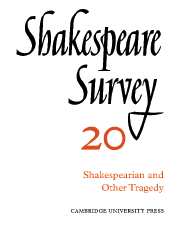Book contents
- Frontmatter
- Shakespeare, Fletcher and Baroque Tragedy
- Seneca and the Elizabethans: A Case-study in ‘Influence’
- George Chapman: Tragedy and the Providential View of History
- Critical Disagreement about Oedipus and Hamlet
- Shakespeare’s Thematic Modes of Speech: ‘Richard II’ to ‘Henry V’
- Anarchy and Order in ‘Richard III’ and ‘King John’
- The Staging of Parody and Parallels in ‘I Henry IV’
- Shakespeare’s Unnecessary Characters
- Walter Whiter’s Notes on Shakespeare
- Shakespeare’s ‘Romeo and Juliet’: Its Spanish Source
- The Grieves Shakespearian Scene Designs
- Shakespeare on the Modern Stage: Past Significance and Present Meaning
- Shakespeare in Brazil
- Recent Shakespeare Performances in Romania
- Shakespeare, the Twentieth Century and ‘Behaviourism’
- The Year's Contributions to Shakespearian Study 1 Critical Studies
- 2 Shakespeare’s Life, Times and Stage
- 3 Textual Studies
- Index
- Plate section
Shakespeare on the Modern Stage: Past Significance and Present Meaning
Published online by Cambridge University Press: 28 March 2007
- Frontmatter
- Shakespeare, Fletcher and Baroque Tragedy
- Seneca and the Elizabethans: A Case-study in ‘Influence’
- George Chapman: Tragedy and the Providential View of History
- Critical Disagreement about Oedipus and Hamlet
- Shakespeare’s Thematic Modes of Speech: ‘Richard II’ to ‘Henry V’
- Anarchy and Order in ‘Richard III’ and ‘King John’
- The Staging of Parody and Parallels in ‘I Henry IV’
- Shakespeare’s Unnecessary Characters
- Walter Whiter’s Notes on Shakespeare
- Shakespeare’s ‘Romeo and Juliet’: Its Spanish Source
- The Grieves Shakespearian Scene Designs
- Shakespeare on the Modern Stage: Past Significance and Present Meaning
- Shakespeare in Brazil
- Recent Shakespeare Performances in Romania
- Shakespeare, the Twentieth Century and ‘Behaviourism’
- The Year's Contributions to Shakespearian Study 1 Critical Studies
- 2 Shakespeare’s Life, Times and Stage
- 3 Textual Studies
- Index
- Plate section
Summary
The criticism of Shakespeare’s plays on the modern stage is practised from so many (and sometimes quite conflicting) angles and is so often overloaded by descriptive detail that, to begin with, it may seem worth while to ask some more general questions of method. During the last four decades literary criticism has so strenuously pleaded for standards of evaluation that the discussion of criteria by which to judge past plays on the contemporary stage may seem a trifle anachronistic. Theatre criticism, however, is not normally burdened by considerations of value or method; it is written so spontaneously, or with a view to reporting information, that it may appear almost ungrateful to look for more than a fair record of spontaneous impressions received on the evening of the performance. But if the performed play is by Shakespeare (or Racine, or Calderoón) this, perhaps, is not enough. Of course it is difficult to generalize about the criticism of Shakespeare productions, since the professional theatre critic’s approach is sometimes quite different from that of the Shakespearian scholar. The former, for instance, is perhaps more apt to be impressed by the originality or the unique style of a production. In things theatrical there is plenty of room for tempeérament, but the originality of either director or critic can be an unreliable basis on which to assess his performance. It is true, no one wants to see the mediocre reproduction of once-famous formulas, and theatre (or criticism) without discovery is unthinkable. The nature and the object of such discovery are, however, a legitimate and, it may be claimed, urgent matter of debate.
- Type
- Chapter
- Information
- Shakespeare Survey , pp. 113 - 120Publisher: Cambridge University PressPrint publication year: 1967
- 2
- Cited by



